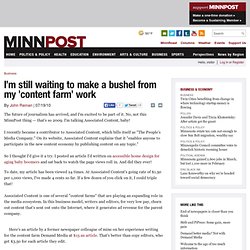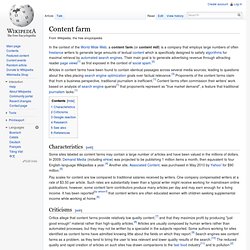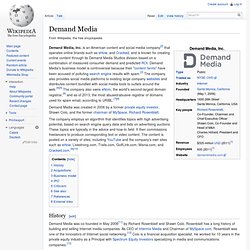

Writers Explain What It's Like Toiling on the Content Farm. “We are going to be the largest net hirer of journalists in the world next year,” AOL’s media and studios division president David Eun said last month in an interview with Michael Learmonth of Ad Age.

Eun suggested that AOL could double its existing stable of 500 full-time editorial staffers in addition to expanding its network of 40,000 freelance contributors. Many of the jobs will be added to its hyper-local venture, Patch, while the majority of AOL’s freelancers will work for the company’s content farms — Seed and the recently acquired video production operation, StudioNow. These two areas into which AOL is ambitiously expanding are the fastest growing sectors of the journalism market. I'm still waiting to make a bushel from my 'content farm' work. The future of journalism has arrived, and I'm excited to be part of it.

No, not this MinnPost thing — that's so 2009. USA Today turns to the content farm as the ship sinks. USA Today, like the majority of dailies in the United States, has a problem.

Last year, its circulation suffered a significant drop, and it's now the number two daily after being surpassed by the Wall Street Journal. So what's USA Today to do? Obviously, it needs to change. And a small change is coming in the form of a deal the newspaper has struck with Demand Media to provide 'Travel Tips by Demand Media' on USAToday.com. Demand Media, of course, is what is often referred to as a 'content farm'. Content farm. Articles in content farms have been found to contain identical passages across several media sources, leading to questions about the sites placing search engine optimization goals over factual relevance.[3] Proponents of the content farms claim that from a business perspective, traditional journalism is inefficient.[1] Content farms often commission their writers' work based on analysis of search engine queries[1] that proponents represent as "true market demand", a feature that traditional journalism lacks.[1] Characteristics[edit] Some sites labeled as content farms may contain a large number of articles and have been valued in the millions of dollars.

In 2009, Demand Media (including eHow) was projected to be publishing 1 million items a month, then equivalent to four English-language Wikipedias a year.[4] Another site, Associated Content, was purchased in May 2010 by Yahoo! For $90 million.[5] Pay scales for content are low compared to traditional salaries received by writers. Demand Media. Demand Media, Inc. is an American content and social media company[2] that operates online brands such as eHow, and Cracked, and is known for creating online content through its Demand Media Studios division based on a combination of measured consumer demand and predicted ROI.

Demand Media's business model is controversial because their "content farms" have been accused of polluting search engine results with spam.[3] The company also provides social media platforms to existing large company websites and distributes content bundled with social media tools to outlets around the web.[4][5] The company also owns eNom, the world's second-largest domain registrar,[6] and as of 2013, the most abused/abusive registrar of domains used for spam email, according to URIBL.[7][8] Demand Media was created in 2006 by a former private equity investor, Shawn Colo, and the former chairman of MySpace, Richard Rosenblatt. History[edit] In July 2008 it was widely reported that Yahoo! Content Farms. Search Engine Land. Feb 17, 2012 at 3:22pm ET by Barry Schwartz Demand Media posts $6.4-million loss in fourth quarter from the Los Angeles Times reports that Google's Panda algorithm is mostly to blame for Demand Media's $6.4 million loss in the fourth quarter of 2011.

Demand Media released their earnings report last night, showing revenues up 15% year over year, but profits down from a positive $1 million in the 4th quarter of 2010 to a loss of $6.4 million in the 4th quarter of 2011. Overall, Demand Media lost $18.5 million over the 2011 fiscal year. Our very own Greg Sterling told the LA Times, "When you generate articles based on keywords, you [...] "content farm" Fighting back against content farms.
A while ago I wrote The Issue of Content Farms and talked about how Google was trying to change their search algorithm to screen out low-quality, advertiser-bait content.

Well, Google tries, but it’s a losing battle. Sites like Ask.com and Mahalo still clutter up your results list with their mostly plagiarized, always useless “articles.” Here’s what you can do about it. First of all, you need to be at a computer where you can choose what browser you use and adjust its settings. Use Google Chrome as your browser. So now you’re logged into Google Chrome and you’re searching in the Google search engine. The URL of the Mahalo.com page about cats is If you paste that into the Block Site box, Google will block all pages from Mahalo. Now, the entire internet is a content farm... Before I begin, I’m aware that what follows likely fits the definition of a “take,” as Awl writer John Hermann calls the endless series of blog posts, online think-pieces and me-too coverage that follow an event like the recent celebrity nude-selfie hack or the Delta Airlines Twitter gaffe.

But I found his post fascinating — not so much because of what he said in it, but because of what the phenomenon he is describing can tell us about the disruption of the traditional media landscape. In his post, Hermann calls the profusion of posts on such news events an “evolutionary defense against attention surplus,” as every media outlet large or small scrambles to cover whatever the trending topic of the day is — regardless of whether they have anything to add in the form of reporting, or analysis, or additional background on the story: There were dozens more of these stories, all about a single tweet, from virtually every outlet that publishes news.
List of content farms. The future of Facebook as a social content farm. In the lofty idealism of Facebook, the world's largest social network fosters basic human connections.

It keeps you in touch with the people you care about. The number of friends you boast on Facebook is a direct measure of the richness of your social life. "Chairs are for people," proclaims one earnest ad, "and that is why chairs are like Facebook. " Now, the company rhetoric, always tenuously connected to reality, is verging on fantasy. Content farms—long the scourge of Google searches, returning worthless junk for promising results—are migrating to Facebook. On Feb. 1, we introduced you to one. Maybe you haven't heard of a content farm. Despite seductive headlines, the articles invariably disappoint.
Step 1: "Decide if you want to be a professional …. or an amateur. " To content farms, quality and utility aren't important. In 2011, Google introduced tweaks to its algorithms intended to cut down on the farms' sway over its search results—changes that largely worked. And: You get the idea. What is a content farm? With half the news media beating up on Google about “content farms” and Demand Media, I thought it would be helpful to brush up on the definition of content farm .

Just one problem: I cannot find a good definition for the term. The earliest use I can find for the term is in a comment posted on TechCrunch by a dgalbraith who wrote: These nebulous rumors seem coincidental considering the raft of bad press they’ve recently been generating for themselves and more importantly Google, as a search-result polluting, junk content farm.